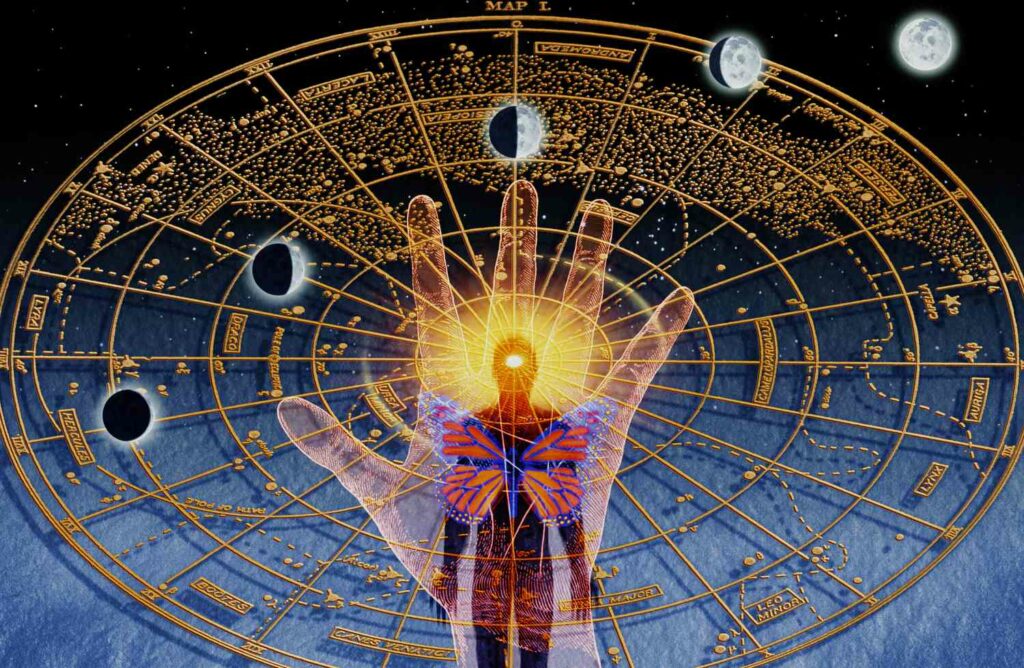The Historical Journey of Astrology
Astrology’s origins trace back to ancient civilizations, such as Mesopotamia, Egypt, and Greece. Early societies believed that celestial patterns had a profound impact on earthly events and human lives. Over time, astrology evolved into different branches, including horoscopic astrology, which forms the basis for most contemporary astrological practices.
Understanding the Core Principles
At the heart of astrology are the Zodiac signs, each associated with specific personality traits. Planets and their positions in the sky, as well as their relationships with different Houses, add layers of complexity to astrological interpretations. These cosmic dynamics offer insights into an individual’s character, strengths, and challenges.
Unveiling Your Birth Chart
Your birth chart, a snapshot of the sky at the moment of your birth, is a personalized map of the celestial energies influencing your life. Rising signs, representing your outward demeanor, combine with the Sun sign (your core essence) and the Moon sign (your emotional core) to create a multifaceted picture of your identity.
Astrology’s Relevance in Modern Times
In the modern world, astrology has found a new avenue through social media and online platforms. Many turn to astrology for self-discovery, relationship advice, and career direction. However, it’s important to approach astrology with a critical mindset and an understanding of its limitations.
Criticism and Controversy
Astrology has its fair share of skeptics who question its scientific validity. Critics argue that there is no empirical evidence to support astrological claims. Moreover, ethical concerns arise when predictions potentially influence life-altering decisions.
Astrology and Relationships
Astrology offers tools for understanding relationships. Compatibility between signs is a popular topic, but a deeper dive into synastry—the study of planetary interactions between individuals—provides a more nuanced view of how cosmic energies intertwine in partnerships.
Career Guidance through Astrology
Astrology can provide insights into suitable career paths by analyzing the planets’ positions at the time of one’s birth. Additionally, Saturn Returns, occurring approximately every 29 years, mark periods of significant career shifts and self-discovery.
Navigating the complexities of the professional world can be both exciting and overwhelming. As you stand at the crossroads of career decisions, astrology offers a unique perspective that can help guide you toward a fulfilling vocational path. By examining the cosmic energies present at the time of your birth, astrology provides insights into your innate talents, potential challenges, and the most suitable avenues for growth.
Identifying Vocational Aptitudes
Your birth chart serves as a cosmic blueprint, outlining the positions of the planets and their relationships with specific houses. These houses represent different areas of your life, including your career. The tenth house, commonly known as the “House of Career,” plays a pivotal role in revealing your vocational inclinations and potential achievements.
Astrologers analyze the planets placed in the tenth house, along with their aspects to other planets, to identify the skills, strengths, and interests that align with your professional aspirations. For instance, if Mercury, the planet of communication and intellect, resides in your tenth house, you might excel in fields that require effective communication, such as writing, teaching, or public speaking.
Saturn Returns: Pivotal Career Phases
One of astrology’s significant milestones is the Saturn Return, which occurs approximately every 29 years. During this time, Saturn completes its orbit around the sun and returns to the same position it held at your birth. Saturn Returns mark periods of self-discovery, maturity, and often significant life changes, including career shifts.
The first Saturn Return, around the ages of 28 to 30, prompts individuals to reevaluate their current career paths and make necessary adjustments. This can involve pursuing new opportunities, seeking additional education, or embarking on a completely different vocational journey. The second Saturn Return, occurring around age 58 to 60, offers another opportunity for reflection and potential redirection.
The Dance of Planets in Your Career Path
Astrology delves deeper by examining the interactions between various planets in your birth chart. Aspects such as conjunctions, squares, trines, and oppositions reveal how different celestial bodies influence one another. Applying this to your career, these interactions shed light on your work style, collaborations, and potential challenges.
For instance, a harmonious trine between Venus and Jupiter might indicate a knack for diplomacy and a natural ability to foster positive relationships in your professional life. On the other hand, a challenging square between Mars and Saturn could signify occasional conflicts between your desire for action and your need for discipline and structure.
Embracing Transits for Career Growth
Transits involve the current positions of planets in relation to the positions they held at the time of your birth. These transiting planets form aspects with the planets in your birth chart, influencing different aspects of your life, including your career. For instance, if Jupiter forms a trine with your natal Sun, it could signify a period of expansion and opportunity in your professional sphere.
Understanding upcoming transits can help you prepare for changes, seize opportunities, and navigate challenges in your career. It’s essential to consult with a professional astrologer who can interpret these transits accurately and provide guidance tailored to your unique circumstances.
Balancing Astrological Insights with Practical Considerations
While astrology offers valuable insights, it’s important to remember that career decisions should not be solely based on astrological guidance. Factors such as education, skills, market demand, and personal preferences also play crucial roles in shaping your professional trajectory.
Astrology complements these practical considerations by providing a holistic view of your potential and helping you align your choices with your true self. By combining astrological insights with careful planning and strategic decision-making, you can create a fulfilling and purpose-driven career path.
Astrology and Health
The Zodiac is linked to different areas of physical and emotional health. By understanding the associations between signs and body parts, as well as planetary influences, individuals can explore holistic approaches to well-being.
The Intersection of Astrology and Psychology
Psychologist Carl Jung saw the archetypes present in astrology as reflections of universal human experiences. Exploring these archetypes through astrological symbols can lead to profound self-awareness and personal growth.
Astrological Myths and Realities
Certain astrological events, like Mercury Retrograde and eclipses, have garnered attention and sometimes misconceptions. Mercury Retrograde, for instance, is often linked to communication issues and misunderstandings.
Navigating Life Transitions with Astrology
Astrology can provide guidance during pivotal life moments. Transit astrology involves analyzing the current positions of planets to understand how they may impact an individual’s life journey.
Cultural and Global Perspectives
Astrology takes on diverse forms in various cultures around the world. From Vedic astrology in India to Chinese astrology’s connection to the lunar calendar, cultural perspectives enrich astrological insights.
Seeking Guidance from Professional Astrologers
Interpreting a birth chart requires expertise. Professional astrologers combine their knowledge of celestial patterns with intuitive insights to provide valuable guidance to those seeking a deeper understanding of their lives.
Conclusion
Astrology, a blend of cosmic wonder and psychological introspection, invites us to explore our lives through a celestial lens. While its validity may be debated, its impact on self-discovery, relationships, and personal growth is undeniable.
FAQs
- Is astrology a science? Astrology is not considered a science in the traditional sense, as it lacks empirical evidence. It’s a metaphysical practice that explores connections between celestial patterns and human experiences.
- Can astrology predict the future? Astrology offers insights into potential influences but doesn’t predict specific events with certainty. It’s more about understanding possibilities and energies.
- Are all horoscopes the same? No, horoscopes can vary widely based on the astrologer’s interpretation and the system they follow. Personalized birth charts offer a more accurate and nuanced view.
- Can astrology help me make major life decisions? Astrology can provide perspectives, but decisions should be made using critical thinking, considering various factors beyond astrological insights.
- How can I find a reliable astrologer? Look for certified professionals with a solid reputation. Personal recommendations and reviews can also guide you to a reputable astrologer.




